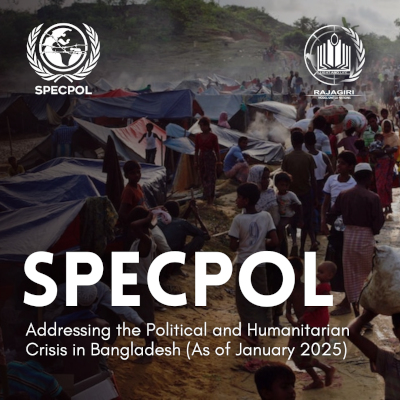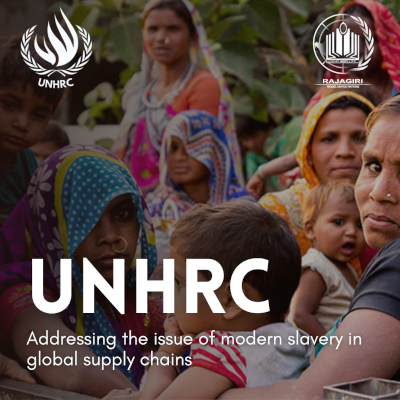
The Special Political and Decolonization Committee
Bangladesh — a nation rich in culture, resilience, and, lately, a little too much political drama. From small protests to the recent overthrow of the Sheikh Hassina government, the nation faces uncertainty, unrest, and rising tension. As power struggles erupt, the streets of Dhaka echo with protest and desperation. A leadership vacuum looms large, and democracy teeters on the edge of a fragile line. The world watches, unsure whether this marks the dawn of change or the dusk of stability. Humanitarian concerns grow as political chaos threatens to spill into every home and village. The citizens have been ripped of their right to self determination due to the instability and inefficiency of the Hassina Government. Nations must work hand in hand to find a comprehensive solution to assist both the political and humanitarian crisis in Bangladesh. This committee exists in the critical months before Sheikh Hasina’s
return from exile in 2025.
Committee Email: rmunspecpol2025@gmail.com

The World Health Organization
In a world marred by conflict, it is the youngest and most vulnerable who suffer the gravest consequences.
Children living in war-zones are often stripped of their most basic rights—access to healthcare, proper
nutrition, and a safe environment.
The World Health Organization (WHO) invites you to step into the shoes of global health leaders and
confront one of the most pressing humanitarian issues of our time: Health and Food Security for Children in
war-zones. This committee offers a unique platform to explore the intersection of healthcare, nutrition, and
humanitarian aid within the context of armed conflict with an added emphasis when it comes to children. As
delegates, you will engage in deep discussions, negotiate real-world policies, and propose innovative
solutions to ensure that no child is left behind—regardless of the circumstances they are born into.
Committee Email: rmunwho2025@gmail.com

The United Nations Development Programme
Small Island Developing States (SIDS) are among the most vulnerable nations on the planet when it comes to climate change. Increased sea levels, more powerful storms, and ecological destruction are endangering their homes, economies, and lifestyle. Despite contributing very little to global carbon emissions, SIDS are experiencing its most severe consequences. The UNDP is committed to assisting these islands in developing resilience and preparing them for the future challenges. In this committee, delegates shall collaborate to develop equitable, innovative, and achievable resolutions to assist SIDS in coping with climate change and safeguard their futures. Addressing this agenda is not just about survival; it’s about unlocking pathways to sustainable growth. Together, we aim to fortify these islands as models of climate adaptation and resilience for the entire world.
The United Nations Human Rights Council
Behind the glittering lights of runways and glossy imagery of fashion advertising lurks a story that few dare
to confront: invisible chains that tie millions throughout the world. The human cost of fast fashion is
astounding, with sweatshops in underdeveloped countries and abusive supply chains hiding in plain sight.
How can we reconcile the beauty of a well-crafted garment with the exploitation that frequently underpins
its creation? Who is responsible when global brands profit while millions of people work in dangerous
conditions, stripped of their rights and dignity? Can the industry ever completely break free from these
systematic inequities, or are they the unintended consequences of our insatiable want for more? The United
Nations Human Rights Council will address these critical issues, concentrating on modern slavery in global
supply chains, with a particular emphasis on the textile and fashion industries.
Email: rmununhrc2025@gmail.com

The United Nations Security Council
The Taiwan Strait, a narrow body of water dividing mainland China and Taiwan, has been a flashpoint in
East Asian geopolitics for decades. The origins of the tension date back to 1949, when the Chinese Civil
War resulted in the Nationalist government fleeing to Taiwan and setting up an independent administration
from the Communist led People's Republic of China on the mainland. The PRC has since regarded Taiwan
as a rebellious province, while Taiwan functions with its own government and democratic institutions. In
recent years, tensions have grown. China has held massive military exercises off Taiwan's coast, including
the "Joint Sword 2024B" exercises, which practiced blockades and precision attacks. The moves are seen as
efforts to intimidate Taiwan and signal Beijing's desire to claim control over the island. Taiwan has, in turn,
increased its defenses and held its own military exercises to prepare for the possibility of war. The United
States, under a policy of strategic ambiguity, has been alarmed by the moves and continues to support
Taiwan with diplomatic efforts and arms sales. The situation is volatile, with the risks of miscalculations
potentially creating wider regional instability.
Committee Email: rmununsc2025@gmail.com